人教版高中英语必修二高中现在分词用法练
- 格式:docx
- 大小:12.88 KB
- 文档页数:3
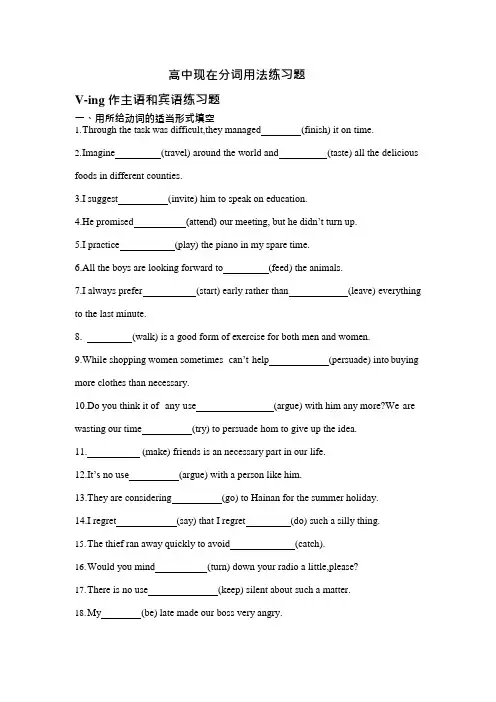
高中现在分词用法练习题V-ing 作主语和宾语练习题一、用所给动词的适当形式填空1.T hrough the task was difficult,they managed (finish) it on time.2.I magine (travel) around the world and (taste) all the delicious foods in different counties.3.I suggest (invite) him to speak on education.4.He promised (attend) our meeting, but he didn’t turn up.5.I practice (play) the piano in my spare time.6.All the boys are looking forward to (feed) the animals.7.I always prefer (start) early rather than (leave) everything to the last minute.8.(walk) is a good form of exercise for both men and women.9.W hile shopping women sometimes can’t help (persuade) into buying more clothes than necessary.10.D o you think it of any use (argue) with him any more?We are wasting our time (try) to persuade hom to give up the idea.11. (make) friends is an necessary part in our life.12.I t’s no use(argue) with a person like him.13.T hey are considering (go) to Hainan for the summer holiday.14.I regret (say) that I regret (do) such a silly thing.15.The thief ran away quickly to avoid (catch).16.Would you mind (turn) down your radio a little,please?17.There is no use (keep) silent about such a matter.18.My (be) late made our boss very angry.19.The teacher told the students to stop and (write,listen) to him.20.He succeeded in (persuade) her to do the job.二、完成句子1.Please (记住开车时要多加小心)next time.2.I (记得被邀请)to their party, but left the invitation in the office.3.When I came in, he (停止读书)and looked up at me.4.When I saw Tom, I .(停下来和他打招呼)but the ignored me.5.He (试图完成)the work with the least cost and fewest people.6.They decided that they would (尝试住在美国)for several years.7.Please (继续做相同的练习)8.Please (继续看书)after doing exercise.9.(窗户需要擦了)动词的ing 形式作表语,定语,宾补和状语一、动词-ing 形式作定语1.Her job is (keep)the lecture hall as clean as possible.她的工作是尽量使报告厅保持干净。
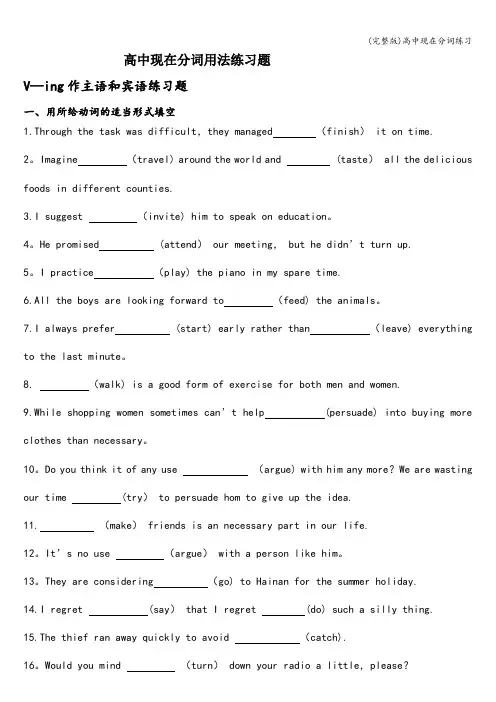
高中现在分词用法练习题V—ing作主语和宾语练习题一、用所给动词的适当形式填空1.Through the task was difficult,they managed (finish) it on time.2。
Imagine (travel) around the world and (taste) all the delicious foods in different counties.3.I suggest (invite) him to speak on education。
4。
He promised (attend) our meeting, but he didn’t turn up.5。
I practice (play) the piano in my spare time.6.All the boys are looking forward to (feed) the animals。
7.I always prefer (start) early rather than (leave) everything to the last minute。
8. (walk) is a good form of exercise for both men and women.9.While shopping women sometimes can’t help (persuade) into buying more clothes than necessary。
10。
Do you think it of any use (argue) with him any more?We are wasting our time (try) to persuade hom to give up the idea.11. (make) friends is an necessary part in our life.12。
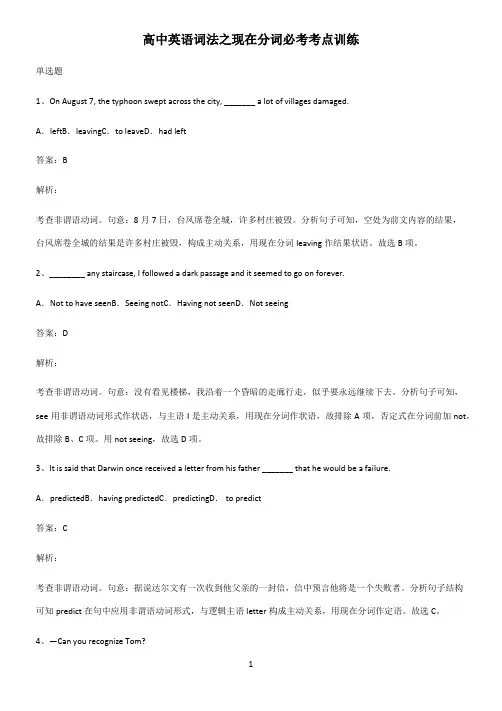
高中英语词法之现在分词必考考点训练单选题1、On August 7, the typhoon swept across the city, _______ a lot of villages damaged.A.leftB.leavingC.to leaveD.had left答案:B解析:考查非谓语动词。
句意:8月7日,台风席卷全城,许多村庄被毁。
分析句子可知,空处为前文内容的结果,台风席卷全城的结果是许多村庄被毁,构成主动关系,用现在分词leaving作结果状语。
故选B项。
2、________ any staircase, I followed a dark passage and it seemed to go on forever.A.Not to have seenB.Seeing notC.Having not seenD.Not seeing答案:D解析:考查非谓语动词。
句意:没有看见楼梯,我沿着一个昏暗的走廊行走,似乎要永远继续下去。
分析句子可知,see用非谓语动词形式作状语,与主语I是主动关系,用现在分词作状语,故排除A项,否定式在分词前加not,故排除B、C项。
用not seeing,故选D项。
3、It is said that Darwin once received a letter from his father _______ that he would be a failure. A.predictedB.having predictedC.predictingD. to predict答案:C解析:考查非谓语动词。
句意:据说达尔文有一次收到他父亲的一封信,信中预言他将是一个失败者。
分析句子结构可知predict在句中应用非谓语动词形式,与逻辑主语letter构成主动关系,用现在分词作定语。
故选C。
4、—Can you recognize Tom?—________him before, I do not know what he looked like.A.Not having seenB.Having not seenC.Not to have seenD.To have not seen答案:A解析:考查非谓语动词。
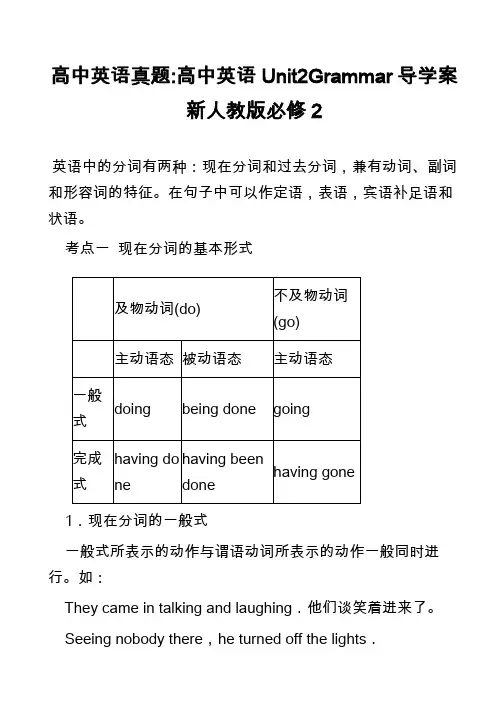
高中英语真题:高中英语Unit2Grammar导学案新人教版必修2英语中的分词有两种:现在分词和过去分词,兼有动词、副词和形容词的特征。
在句子中可以作定语,表语,宾语补足语和状语。
考点一现在分词的基本形式1.现在分词的一般式一般式所表示的动作与谓语动词所表示的动作一般同时进行。
如:They came in talking and laughing.他们谈笑着进来了。
Seeing nobody there,he turned off the lights.看到没人在那,他就把灯关了。
2.现在分词的完成式完成式表示的动作发生在谓语动词的动作之前。
如:Having cleaned the desks,we began reading.擦完了桌子后,我们便开始看书。
Having been surrounded for a month,the enemy had to give in.被包围一个月后,敌人不得不投降了。
3.现在分词的被动语态现在分词的被动语态分为一般式和完成式两种。
一般式表示一个被动动作正在进行。
或与谓语表示的动作同时进行。
完成式表示一个被动动作在谓语表示的动作之前已经完成了。
如: The building being built will be our school library.正在建造的那座大楼将是我们的校图书馆。
[例] ____ ,we were taken to Bee the library.A.We had been shown the classrooms B.Being shown the classroomsC.Having been shown the classrooms D.Having shown the classrooms[解析] 句意:我们先被领着看了教室,又被带去看图书馆。
首先,句子主语与show之间构成被动关系,因此可排除D项;A项为句子,需要加连词连接两个分句;B项相当于While we were being shown the classrooms,显然与后面的时间有冲突,故只有C项正确。
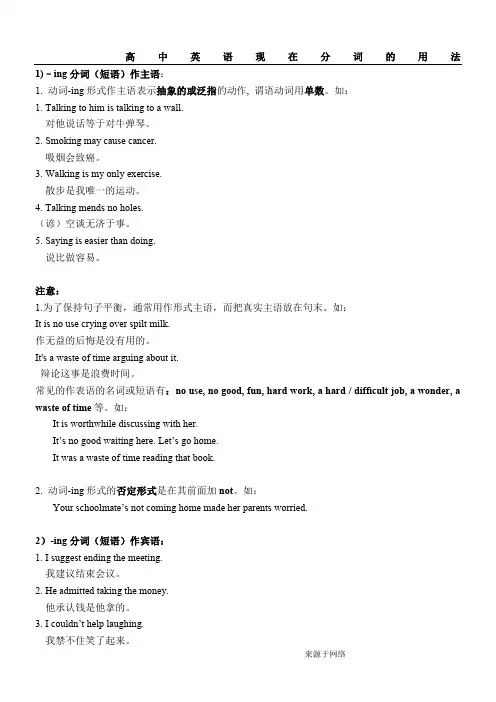
高中英语现在分词的用法1)–ing分词(短语)作主语:1. 动词-ing形式作主语表示抽象的或泛指的动作, 谓语动词用单数。
如:1. Talking to him is talking to a wall.对他说话等于对牛弹琴。
2. Smoking may cause cancer.吸烟会致癌。
3. Walking is my only exercise.注意:1.2. 动词2)-ing分词(短语)作宾语:1. I suggest ending the meeting.我建议结束会议。
2. He admitted taking the money.他承认钱是他拿的。
3. I couldn’t help laughing.我禁不住笑了起来。
4. Your coat needs brushing.你的大衣需要刷一下。
注意:1. 有些动词如admit, avoid, consider, escape, deny, risk, suggest等后要接动词-ing形式作宾语,而不能接动词不定式。
如:We’re considering visit ing the Museum.2. 有些短语如can’t help, be used to, end up, feel like, lead to, be busy, be tired of, be fond of, be3. 相当于to be done3) -ing4).-ing1. ,也可buildingdrinking= water for drinking 饮用水a walking stick= a stick for walking 手杖a reading room= a room for reading 阅览室a writing desk= a desk for writing 写字台tiring music= music that is tiring 烦人的音乐a surprising result= a result that is surprising 一个惊人的结果2. -ing形式短语作定语时, 放在所修饰的名词之后, 并且在意思上相当于一个定语从句。
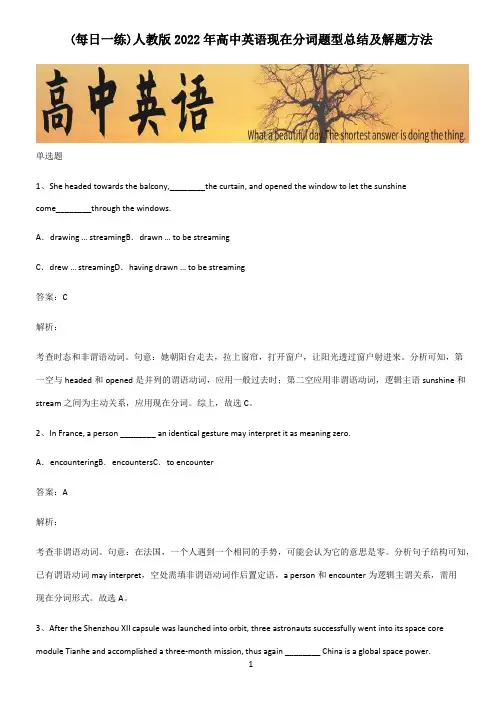
(每日一练)人教版2022年高中英语现在分词题型总结及解题方法单选题1、She headed towards the balcony,________the curtain, and opened the window to let the sunshinecome________through the windows.A.drawing … streamingB.drawn … to be streamingC.drew … streamingD.having drawn … to be streaming答案:C解析:考查时态和非谓语动词。
句意:她朝阳台走去,拉上窗帘,打开窗户,让阳光透过窗户射进来。
分析可知,第一空与headed和opened是并列的谓语动词,应用一般过去时;第二空应用非谓语动词,逻辑主语sunshine和stream之间为主动关系,应用现在分词。
综上,故选C。
2、In France, a person ________ an identical gesture may interpret it as meaning zero. A.encounteringB.encountersC.to encounter答案:A解析:考查非谓语动词。
句意:在法国,一个人遇到一个相同的手势,可能会认为它的意思是零。
分析句子结构可知,已有谓语动词may interpret,空处需填非谓语动词作后置定语,a person和encounter为逻辑主谓关系,需用现在分词形式。
故选A。
3、After the Shenzhou XII capsule was launched into orbit, three astronauts successfully went into its space core module Tianhe and accomplished a three-month mission, thus again ________ China is a global space power.A.provedB.to proveC.to have provedD.proving答案:D解析:考查非谓语动词。

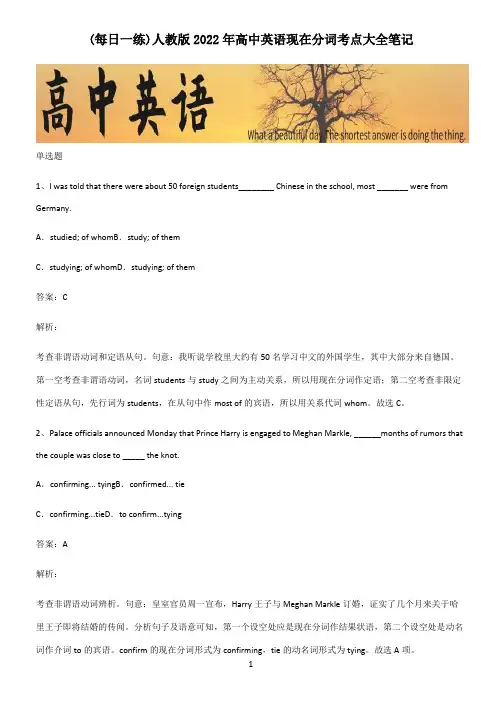
(每日一练)人教版2022年高中英语现在分词考点大全笔记单选题1、I was told that there were about 50 foreign students________ Chinese in the school, most _______ were from Germany.A.studied; of whomB.study; of themC.studying; of whomD.studying; of them答案:C解析:考查非谓语动词和定语从句。
句意:我听说学校里大约有50名学习中文的外国学生,其中大部分来自德国。
第一空考查非谓语动词,名词students与study之间为主动关系,所以用现在分词作定语;第二空考查非限定性定语从句,先行词为students,在从句中作most of的宾语,所以用关系代词whom。
故选C。
2、Palace officials announced Monday that Prince Harry is engaged to Meghan Markle, _____months of rumors that the couple was close to _____ the knot.A.confirming... tyingB.confirmed (i)C.confirming...tieD.to confirm...tying答案:A解析:考查非谓语动词辨析。
句意:皇室官员周一宣布,Harry王子与Meghan Markle订婚,证实了几个月来关于哈里王子即将结婚的传闻。
分析句子及语意可知,第一个设空处应是现在分词作结果状语,第二个设空处是动名词作介词to的宾语。
confirm的现在分词形式为confirming,tie的动名词形式为tying。
故选A项。
3、The young actor has broken his marriage faith with his wife for another actress, ________ much comment against him in blogs.A.setting offB.to set apartC.setting forthD.to set on答案:A解析:考查动词短语辨析和非谓语动词。
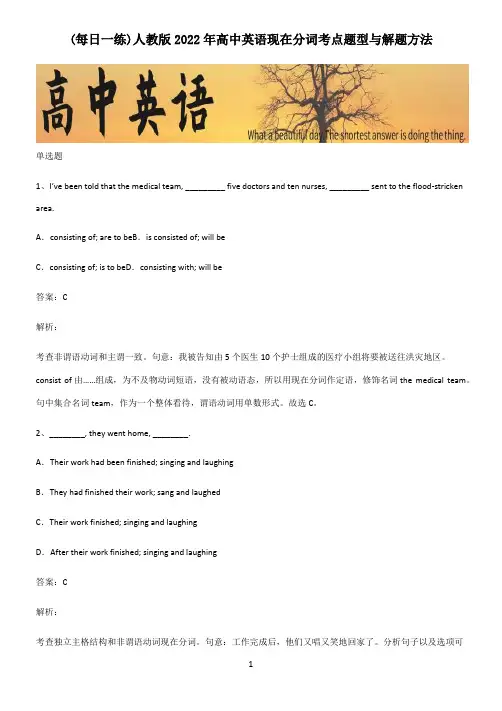
(每日一练)人教版2022年高中英语现在分词考点题型与解题方法单选题1、I’ve been told that the medical team, _________ five doctors and ten nurses, _________ sent to the flood-stricken area.A.consisting of; are to beB.is consisted of; will beC.consisting of; is to beD.consisting with; will be答案:C解析:考查非谓语动词和主谓一致。
句意:我被告知由5个医生10个护士组成的医疗小组将要被送往洪灾地区。
consist of由……组成,为不及物动词短语,没有被动语态,所以用现在分词作定语,修饰名词the medical team。
句中集合名词team,作为一个整体看待,谓语动词用单数形式。
故选C。
2、________, they went home, ________.A.Their work had been finished; singing and laughingB.They had finished their work; sang and laughedC.Their work finished; singing and laughingD.After their work finished; singing and laughing答案:C解析:考查独立主格结构和非谓语动词现在分词。
句意:工作完成后,他们又唱又笑地回家了。
分析句子以及选项可知,句首为独立主格结构“主语+分词”作状语;如果状语部分为从句,则必须有从属连词引导,故排除AB两项;如果状语部分有从属连词(after),从句中不可省略谓语,故排除D项。
句尾因动词sing和laugh和主语they 之间是主动关系,用现在分词作伴随状语,排除B项。
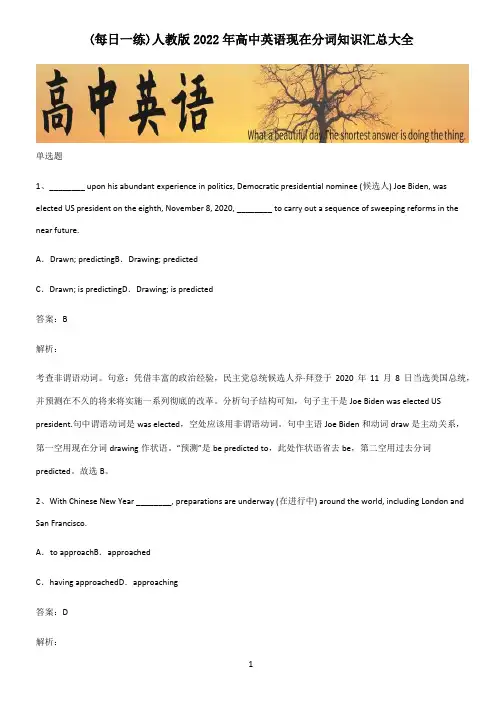
(每日一练)人教版2022年高中英语现在分词知识汇总大全单选题1、________ upon his abundant experience in politics, Democratic presidential nominee (候选人) Joe Biden, was elected US president on the eighth, November 8, 2020, ________ to carry out a sequence of sweeping reforms in the near future.A.Drawn; predictingB.Drawing; predictedC.Drawn; is predictingD.Drawing; is predicted答案:B解析:考查非谓语动词。
句意:凭借丰富的政治经验,民主党总统候选人乔·拜登于2020年11月8日当选美国总统,并预测在不久的将来将实施一系列彻底的改革。
分析句子结构可知,句子主干是Joe Biden was elected US president.句中谓语动词是was elected,空处应该用非谓语动词。
句中主语Joe Biden和动词draw是主动关系,第一空用现在分词drawing作状语。
“预测”是be predicted to,此处作状语省去be,第二空用过去分词predicted。
故选B。
2、With Chinese New Year ________, preparations are underway (在进行中) around the world, including London and San Francisco.A.to approachB.approachedC.having approachedD.approaching答案:D解析:考查非谓语动词。
句意:随着农历新年的临近,世界各地正在进行准备工作,包括伦敦和旧金山。
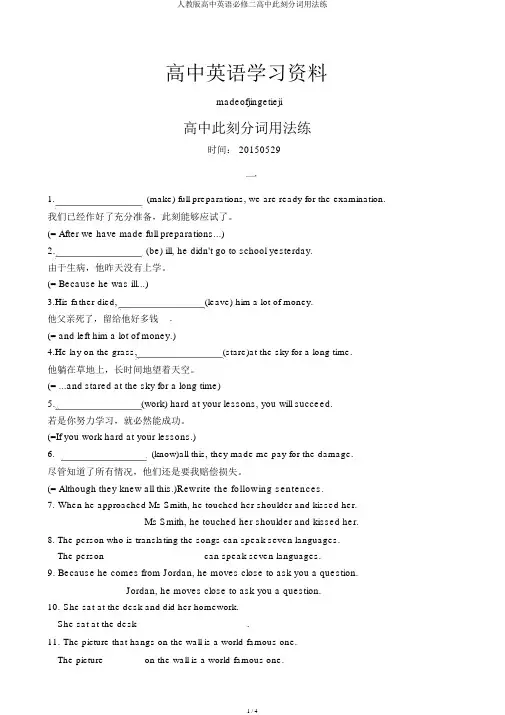
高中英语学习资料madeofjingetieji高中此刻分词用法练时间: 20150529一1.(make) full preparations, we are ready for the examination.我们已经作好了充分准备,此刻能够应试了。
(= After we have made full preparations...)2.(be) ill, he didn't go to school yesterday.由于生病,他昨天没有上学。
(= Because he was ill...)3.His father died,(leave) him a lot of money.他父亲死了,留给他好多钱.(= and left him a lot of money.)4.He lay on the grass,(stare)at the sky for a long time.他躺在草地上,长时间地望着天空。
(= ...and stared at the sky for a long time)5.(work) hard at your lessons, you will succeed.若是你努力学习,就必然能成功。
(=If you work hard at your lessons.)6.(know)all this, they made me pay for the damage.尽管知道了所有情况,他们还是要我赔偿损失。
(= Although they knew all this.)Rewrite the following sentences.7.When he approached Ms Smith, he touched her shoulder and kissed her.________________ Ms Smith, he touched her shoulder and kissed her.8.The person who is translating the songs can speak seven languages.The person _________ ___ ______can speak seven languages.9.Because he comes from Jordan, he moves close to ask you a question._______ _____ Jordan, he moves close to ask you a question.10.She sat at the desk and did her homework.She sat at the desk ______ ____ __________.11.The picture that hangs on the wall is a world-famous one.The picture _______ on the wall is a world-famous one.12.Because he didn’ t receive an answer, he decided to write anotherletter to him.____ ____________ an answer, he decided to write another letter to him.13.When he sees the mountain, he always thinks of his hometown._______ the mountain, he always thinks of his hometown.14.Because it is Sunday, there are no students in the school.It _____ ______, there are no students in the school.15.He hunted all the shops to look for a nice present for his mother.He hunted all the shops, ______ ___ a nice present for his mother.二1.Her job is(keep)the lecture hall as clean as possible.2..The problem is quite(puzzle).3. When we returned, we found a stranger(stand) in front of the house. 4. I felt somebody(talk) behind me.5. I heard a girl(cry) in the dark.6. I noticed a thief(steal) on the bus.7. We kept the fire(burn)all night long.8. I won ‘ t have you(run)g about in the room.9. He kept her(wait) understaris the whole day.10._______(clean) women in big cities usually get paid by the hour.11.All of us watched the hunter ________(bring) down the dangerous bear.12.When he woke up, he found himself ________ (lie) in hospital.13.Electricity lines were brought down by ___________ (fall) trees in the storm.14.The tall building _________ (build) now will be a hospital.15.The man ________ (wear) a sad look said, "I've lost my wallet."16.— What is a water can used for?— It's used to _________ (water) flowers or something like that.17.There was a terrible noise__________ (follow) the sudden burst of light.18.The missing boy was last seen_________ (play) near the river.19. In parts of Asia you must not sit with your feet _______(point) at another person.20.It was so cold that they kept the fire ______ (burn)all night.21.He looked around and caught a man ______(put) his hand into the pocket of a passenger. 22.—Did you meet anyone ______ (interest)at the party?—No, in fact, I found the party rather ______.(bore)23.he salesman scolded the girl caught ______ (steal)and let her off.24.____(hear) the bad news made him cry.25.He sat there ______ (read)a novel.26._____(satisfy ) with his report , I told him to write it all over again.27._____ (carry) our shoes in our hands , we crossed the stream.28._____ (finish) my homework, I went home.29.____ (find) the door unlocked, I went in.30.______ (be) a careless fellow, he forget all about it.31.You must be careful when _______ (drive) on the highway.32.Engines are machines ___ (produce)power or motion.33.___ (finish) the painting, he gave a sigh of relief.34. Don ’ t sit there(do) nothing. Come and help me with this table.35.The storm left, ________ (cause) a lot of damage to this area.36.“ You can ’ t catch me! ” Jane shouted,(run) away.37.________ (know) this, you should have no trouble with the difficult work.38. Never________ (lose) faith in himself, the scientist went on with his research.39.________ (not made) full preparations, we decided to put off the meeting till next week. 40.Have you forgotten_____(borrow)a ruler from Betty? Please remember______ (return)it to her tomorrow.三1.翻译这本书的老师能说几种语言2.坐在树下的女孩是我姐姐3.我们已经找到了扔掉的孩子4.没有完成作业的学生不能够回家5.听到这个信息,学生们快乐地跳了起来6.认识到了错误,我想他道了歉7.拿着一朵花,他向女孩走近女孩8.由于迟到,我收到了责怪Yesterday we made a trip to the mountain .______made a good preparation ,we set outAt seven. We spent two hours ______drive on the road .________arrive there ,we sawa beautiful scene. It took us four hours ______play on the mountain. We had lunch at one in the afternoon. After ______have lunch ,we went on ______play on the mountain We went home ateight in the evening.敬请责怪指正。
(每日一练)人教版2022年高中英语现在分词知识点总结(超全)单选题1、________ to speak, I’ll start making preparations tomorrow.A.To have been invitedB.To be invitedC.Having been invitedD.Having invited答案:C解析:考查非谓语动词。
句意:因为邀请我去讲话,我明天就得做准备。
分析句子可知,句子谓语动词是start,invite用非谓语动词形式作原因状语,根据句意可知,“邀请去讲话”先于“开始准备”之前,用完成式,且invite 与逻辑主语I是被动关系,用现在分词的完成式的被动式,不定式常用来作目的状语,故选C项。
2、The young man, ________several attempts to beat the world record in jumping, decided to have another try. A.madeB.to makeC.having madeD.making答案:C解析:考查非谓语动词。
句意:那个年轻人尝试了几次,想打破跳远世界纪录,决定再试一次。
句中逻辑主语The young man与 make之间为主动关系,且从句的动作发生在主句动作decided to之前,所以用having done。
故选C。
3、_______their son’s response letter, the con cerned parents wrote another one and had it delivered at once. A.Having nor receivedB.Not having receivedC.Not receivingD.Not received答案:B解析:考查非谓语动词。
句意:没有收到他们儿子的回信,担心的父母马上写了另外一封信送出去。
(每日一练)人教版2022年高中英语现在分词总结(重点)超详细单选题1、Look ! The building ________ now is our teaching building .A.being builtB.builtC.to be builtD.building答案:A解析:考查非谓语动词。
句意:看!正在建造的大楼是我们的教学楼。
本句为主系表结构,所以空处为非谓语动词,The building与build在逻辑上是被动关系,且表示正在进行,所以用现在分词的被动形式。
故选A项。
2、Although no deaths________ alligator attacks________ in Texas during the past 15 years, 17 people reported injuries last month.A.res ulting in… were reportedB.resulted in… were reportedC.resulting from…have been reportedD.resulted from…have been reported答案:C解析:考查非谓语动词和时态语态。
句意:尽管在过去的15年里,德克萨斯州没有因鳄鱼袭击而死亡的报道,但上个月有17人受伤。
第一空result in表示“导致,结果是”,result from表示“起因于,由于”,结合后文“alligator attacks”可知指由于鳄鱼袭击而造成的死亡,应用现在分词短语resulting from,作定语;第二空主语与谓语构成被动关系,结合后文during the past 15 years可知为现在完成时的被动语态。
故选C。
3、With no rain for months and fresh water ________, the situation in Yunan Province was getting from bad to worse . A.run outB.run out ofC.running outD.running out of答案:C解析:考查非谓语动词。
(每日一练)(文末附答案)人教版2022年高中英语现在分词知识总结例题单选题1、China has accelerated crucial transformations in the role of government, _______the market to play a decisive role. A.to allowB.allowedC.having allowedD.allowing2、The hospital has recently obtained new medical equipment, ______ more patients to be treated.A.to allowB.allowingC.allowedD.having allowed3、________ receiving a phone call from his wife ________ she had a fall, Mr. Smith immediately rushed home from his office.A.On; to sayB.On; sayingC.In; to sayD.In; saying4、Tom looked at Jenny, with tears his eyes, and shouted out the words in his heart for years. A.filling; hidingB.filled; hiddenC.filling; hiddenD.filled; hiding5、Tom got to the hospital in time that day, ________the first bus.A.catchingB.to have caughtC.to catchD.caught6、____ the answer, the pretty girl decided to write another e-mail again.A.Not receivingB.Receiving notC.Not having receivedD.Having not received7、The Louvre just put its entire art collections online, ________ anyone with a smart phone or a computer to enjoy the museum's collections virtually without booking a ticket to Paris.A.to be allowedB.allowingC.having allowedD.allowed8、________ his accent, we know that he is from the south.A.Judging fromB.Judging withC.Judged byD.Judged from9、________ the programme, they have to stay there for another two weeks.A.Not completingB.Not completedC.Not having completedD.Having not completed10、The flowers __ sweet in the botanic garden attract the visitors to the beauty of nature. A.to smellB.smellingC.smeltD.to be smelt人教版2022年高中英语现在分词_00B参考答案1、答案:D解析:考查非谓语动词。
(每日一练)(文末附答案)人教版2022年高中英语现在分词题型总结及解题方法单选题1、Penny jumped out of the way to avoid ________ by the ________ branch.A.hitting; fallenB.being hit; fallingC.to be hit; fallingD.having been hit; fallen2、Filled ________ team spirit, they act as a whole, always ________ for glory.A.with; aimingB.by; aimedC.of; aimD.in; are aimed3、________ a reply, he decided to write again.A.Not receivingB.Not receivedC.Having not receivingD.Not having received4、More highways have been built in China, ________ it much easier for people to travel from one place to another. A.makeB.madeC.to makeD.making5、Palace officials announced Monday that Prince Harry is engaged to Meghan Markle, _____months of rumors that the couple was close to _____ the knot.A.confirming... tyingB.confirmed (i)C.confirming...tieD.to confirm...tying6、Self-objectification may be a bigger problem for men, _____ the time and effort to edit and improve their selfies, before posting them online.A.many takenB.with many takingC.many tookD.with much taken7、No sooner had the bell_________ that the class was over rung _________ the students rushed out of the classroom for the dining hall.A.indicated… whenB.indicating…thanC.indicating…whenD.to indicate…than8、________ his famous number 23 shirt, Michael Jordan became the most successful basketball player in the history of the game.A.WoreB.WearingC.WearsD.Wear9、On the second morning Tony, ________ an apron, brought her breakfast and then asked her ________she needed help dressing.A.wearing; whetherB.wore; whetherC.wore; ifD.wearing; how10、—Is there any danger for the patient ________ on by Dr. Smith?—Hard to say. Doctors are trying their best.A.to operateB.being operatedC.to be operatedD.operating人教版2022年高中英语现在分词_009参考答案1、答案:B解析:考查非谓语动词。
(每日一练)(文末附答案)人教版2022年高中英语现在分词知识点总结(超全)单选题1、People sit uncomfortably on plastic chairs, _______ through old magazines, all of _______ have been read hundreds of times previously.A.look; thatB.looking; whichC.looking; whomD.looking; that2、________ to speak, I’ll start making preparations tomorrow.A.To have been invitedB.To be invitedC.Having been invitedD.Having invited3、________in the street, I came across an old friend of mine.A.To walkB.WalkedC.WalkingD.Having walked4、_____________ this, he spread some food on the table and produced a bed from the floor.A.Having saidB.Being saidC.Having been saidD.To say5、He was surprised to find a lot of people________ at the back of the room ________ masks.A.seating; wearingB.sat; woreC.sitting; wornD.seated; wearing6、Many students ________ confidence find it hard to accomplish the difficult learning tasks. A.lackedB.lackingC.lacking ofD.lacked in7、More freeways have been built in China, ________ it much ________ for people to travel from one place to another.A.making; easilyB.making; easierC.to make; easierD.to make; easily8、When he woke up, he found himself _________ on the ground.A.lyingB.liesC.layD.laid9、Back from his two-year medical service in Africa, Dr. Lee was very happy to see his mother_________good care of his family at home.A.takingB.takenC.to takeD.be taken10、The car________ to me last year was sold .A.belongedB.was belongedC.belongingD.to belong人教版2022年高中英语现在分词_007参考答案1、答案:B解析:考查非谓语动词和非限制性定语从句关系词。
(每日一练)(文末附答案)人教版2022年高中英语现在分词知识点归纳总结(精华版)单选题1、When everyone came into the house, he was found ________ on the floor.A.lainB.lyingC.being lainD.lie2、With animals ________ their changing environment, their next generations evolved to different species. A.being adapted toB.adapting toC.adapt toD.adapted to3、____ the answer, the pretty girl decided to write another e-mail again.A.Not receivingB.Receiving notC.Not having receivedD.Having not received4、He was busy writing a story, only ______ once in a while to smoke a cigarette.A.to stopB.stoppingC.to have stoppedD.having stopped5、This lack of self-interet and promotion kept Cunningha m focused on his craft, ________ him to capture New York’s unique street style.A.to enableB.enablingC.enabledD.enables6、With the teacher's words________ in their ears, the students worked hard at their schoolwork. A.ringingB.to ringC.rungD.rang7、In the morning, my friend posted a message on social media ________ she had a cold.A.saidB.to sayC.sayingD.says8、The flowers _________ sweet attract the visitors to the beauty of nature, which _________ in the botanic gardenlast year.A.to smell; grewB.smell; were grownC.smelling; were grownD.smelt; were growing9、________ from university, Peter spent two years doing a part-time job before finally finding a position in a small company.A.GraduatedB.Having graduatedC.GraduateD.Being graduated10、On August 7, the typhoon swept across the city, _______ a lot of villages damaged. A.leftB.leavingC.to leaveD.had left人教版2022年高中英语现在分词_011参考答案1、答案:B解析:考查现在分词。
高中现在分词用法练时间:20150529一1. (make) full preparations, we are ready for the examination. 我们已经作好了充分准备,现在可以应考了。
(= After we have made full preparations...)2. (be) ill, he didn't go to school yesterday.由于生病,他昨天没有上学。
(= Because he was ill...)3.His father died, (leave) him a lot of money.他父亲死了,留给他许多钱.(= and left him a lot of money.)4.He lay on the grass, (stare)at the sky for a long time.他躺在草地上,长时间地望着天空。
(= ...and stared at the sky for a long time)5. (work) hard at your lessons, you will succeed.如果你努力学习,就一定能成功。
(=If you work hard at your lessons.)6. (know)all this, they made me pay for the damage.尽管知道了一切情况,他们还是要我赔偿损失。
(= Although they knew all this.)Rewrite the following sentences.7. When he approached Ms Smith, he touched her shoulder and kissed her.________________ Ms Smith, he touched her shoulder and kissed her.8. The person who is translating the songs can speak seven languages.The person _________ ___ ______can speak seven languages.9. Because he comes from Jordan, he moves close to ask you a question._______ _____ Jordan, he moves close to ask you a question.10. She sat at the desk and did her homework.She sat at the desk ______ ____ __________.11. The picture that hangs on the wall is a world-famous one.The picture _______ on the wall is a world-famous one.12. Because he di dn’t receive an answer, he decided to write another letter to him. ____ ____________ an answer, he decided to write another letter to him.13. When he sees the mountain, he always thinks of his hometown._______ the mountain, he always thinks of his hometown.14. Because it is Sunday, there are no students in the school.It _____ ______, there are no students in the school.15. He hunted all the shops to look for a nice present for his mother.He hunted all the shops, ______ ___ a nice present for his mother.二1.Her job is (keep)the lecture hall as clean as possible.2..The problem is quite (puzzle).3.When we returned, we found a stranger (stand) in front of the house. 4.I felt somebody (talk) behind me.5.I heard a girl (cry) in the dark.6.I noticed a thief (steal) on the bus.7.We kept the fire (burn)all night long.8.I won‘t have you(run)g about in the room.9.He kept her (wait) understaris the whole day.10._______(clean) women in big cities usually get paid by the hour.11.All of us watched the hunter ________ (bring) down the dangerous bear. 12.When he woke up, he found himself ________ (lie) in hospital.13.Electricity lines were brought down by ___________ (fall) trees in the storm. 14.The tall building _________ (build) now will be a hospital.15.The man ________ (wear) a sad look said, "I've lost my wallet."16.—What is a water can used for?—It's used to _________ (water) flowers or something like that.17.There was a terrible noise __________ (follow) the sudden burst of light. 18.The missing boy was last seen _________ (play) near the river.19.In parts of Asia you must not sit with your feet _______ (point) at another person.20. It was so cold that they kept the fire ______ (burn)all night.21. He looked around and caught a man ______(put) his hand into the pocket of a passenger. 22.—Did you meet anyone ______ (interest)at the party?—No, in fact, I found the party rather ______.(bore)23.he salesman scolded the girl caught ______ (steal)and let her off.24.____(hear) the bad news made him cry.25.He sat there ______ (read)a novel.26._____(satisfy ) with his report , I told him to write it all over again.27._____ (carry) our shoes in our hands , we crossed the stream.28._____ (finish) my homework, I went home.29.____ (find) the door unlocked, I went in.30.______ (be) a careless fellow, he forget all about it.31. You must be careful when _______ (drive) on the highway.32.Engines are machines ___ (produce)power or motion.33.___ (finish) the painting, he gave a sigh of relief.34. Don’t sit there________ (do) nothing. Come and help me with this table.35. The storm left, ________ (cause) a lot of damage to this area.36. “You can’t catch me!” Jane shouted, ________ (run) away.37.________ (know) this, you should have no trouble with the difficult work.38. Never________ (lose) faith in himself, the scientist went on with his research.39.________ (not made) full preparations, we decided to put off the meeting till next week. 40.Have you forgotten_____(borrow)a ruler from Betty? Please remember______ (return)it to her tomorrow.三1.翻译这本书的老师能说几种语言2.坐在树下的女孩是我姐姐3.我们已经找到了丢失的孩子4.没有完成作业的学生不能回家5.听到这个消息,学生们高兴地跳了起来6.认识到了错误,我想他道了歉7.拿着一朵花,他向女孩走近女孩8.由于迟到,我收到了批评Yesterday we made a trip to the mountain .______made a good preparation ,we set outAt seven. We spent two hours ______drive on the road .________arrive there ,we saw a beautiful scene. It took us four hours ______play on the mountain. We had lunch at one in the afternoon. After ______have lunch ,we went on ______play on the mountain We went home at eight in the evening.。